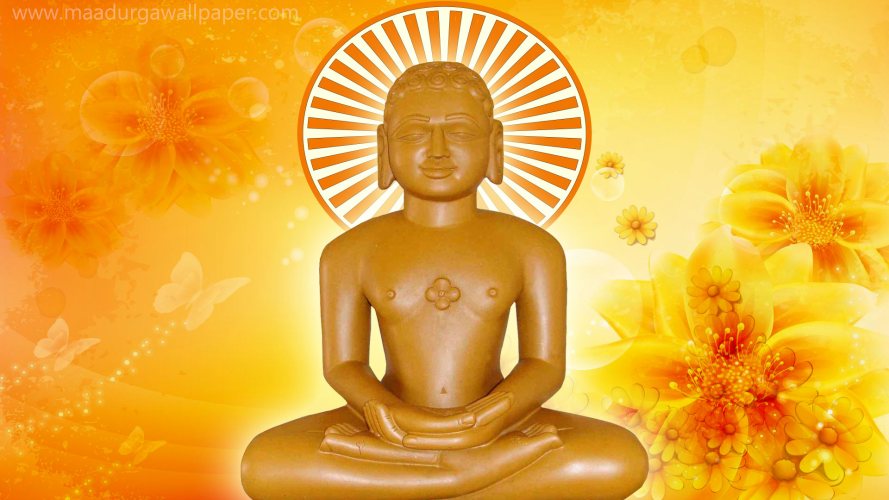पिछली बार हमने ‘अति पुण्य उदय मम आया’ स्तुति का अर्थ देखा था | इस बार हम ‘ब्र.श्री रविन्द्र जी आत्मन्’ द्वारा रचित भावपूर्ण देव स्तुति का अर्थ देखेंगे | आशा है ये स्तुति पढ़ने के बाद हमको भी अपना जिनेन्द्र स्वरुप दिखाई देगा |
Last time, we had read the meaning of “Ati Punya Uday Mum Aaya” stuti. This time we will read the meaning of stuti written by ‘Br. Shri Ravindra Ji Aatman’. I hope after reading this stuti, we will also see our God form.
. . .
कैसी सुन्दर जिन प्रतिमा है, कैसा सुंदर है जिन रूप |
जिसे देखते सहज दीखता, सबसे सुंदर आत्मस्वरुप ||(1)
हे प्रभु आपकी प्रतिमा/ मूर्ति कितनी सुन्दर है ! आपका जिनेश्वररूप कितना सुन्दर है की जिसे देखकर मुझे अपना आत्म स्वरुप जो सुन्दरतम है वह दिखता है |
How beautiful this idol of Jinendra Bhagwan is! How beautiful the form of Jinendra is! On seeing it, we automatically see the most beautiful self(referring to own soul).
नग्न दिगम्बर नहीं आडम्बर, स्वाभाविक है शांत स्वरुप |
नहीं आयुध नहीं वस्त्राभूषण, नहीं संग नारी दुःख रूप ||(2)
आप नग्न दिगंबर दशा को धारण किये हुए हैं जिसमें किसी प्रकार का बाहरी आडम्बर नहीं है इसलिए आपका स्वरुप सहज ही शांत है | न ही आपके पास कोई अस्त्र-शस्त्र हैं, न ही वस्त्र-आभूषण और न ही आपके साथ नारी है क्यूंकि ये सभी दुःख के कारण हैं |
Since the form is naked without pageantry, it is obvious to have a calm image. He does not have any weapon, clothes and is not with a woman which are all cause of unhappiness.
बिन श्रृंगार सहज ही सोहे, त्रिभुवन माहि अतिशय रूप |
कायोत्सर्ग दशा अविकारी, नासा दृष्टि आनंदरूप ||(3)
बिना किसी श्रृंगार के तीनो लोकों में आपका अतिशयकारी रूप सहज ही शोभ रहा है | आपकी कायोत्सर्ग मुद्रा सभी विकारो को नष्ट करने वाली है | आपकी नासग्र दृष्टि आनंददायक है |
Without makeup, he naturally looks fascinating in the three worlds (Heaven, Hell, Middle world where we live). His spiritual meditation position is passionless and his Nasa drashti (to concentrate the eyes on the tip of the nose at the time of meditation) is delightful.
अर्हत प्रभु की याद दिलाती, दर्शाती अपना प्रभु रूप |
बिन बोले ही प्रगट कर रही, मुक्तिमार्ग अक्षय सुखरूप ||(4)
आपकी मुद्रा अरिहंत प्रभु की याद दिलाती है और मेरा प्रभु समान रूप दर्शा रही है | बिना कुछ बोले ही आप मुझे सुखी करने वाला मुक्ति का मार्ग दिखाते हो |
The idol reminds us of Lord Arihant and reflects our God form. Without even speaking, it is showing us the path of liberation which leads to happiness.
जिसे देखते सहज नशावे, भव-भव के दुष्कर्म विरूप |
भावों में निर्मलता आवे, मानो हुए स्वयं जिनरूप ||(5)
हे जिनेन्द्र भगवान! आपकी प्रतिमा ऐसी है जिसे देख कर मेरे भावों के पाप अपने आप ही नष्ट हो जाते हैं | मेरे भावो में ऐसी निर्मलता आती है मानो मैं अभी ही आपके समान हो गया हूँ |
On seeing which the sins of many lives get destroyed automatically. The thoughts become pure as if we have become like God.
महाभाग्य से दर्शन पाया, पाया भेद-विज्ञान अनूप |
चरणों में हम शीश नवावेें, परिणति होवे साम्यस्वरुप ||(6)
मेरे आज महानपुण्य का उदय आया है जो मुझे आपका दर्शन मिला | मैंने आज भेद-विज्ञान पाया है | आपके चरणों में सिर झुका कर मैं यही भावना भाता हूँ की मेरे परिणामों में समता आये |
With great fortune, we have viewed the idol of Jinendra Bhagwan and got discrimination insight (bhed-Vigyan). We bow to the feet of God wishing for the balanced thoughts (equanimity).
Lyrics Source: https://forum.jinswara.com/t/kaisi-sundar-jin-pratima-hai/206
